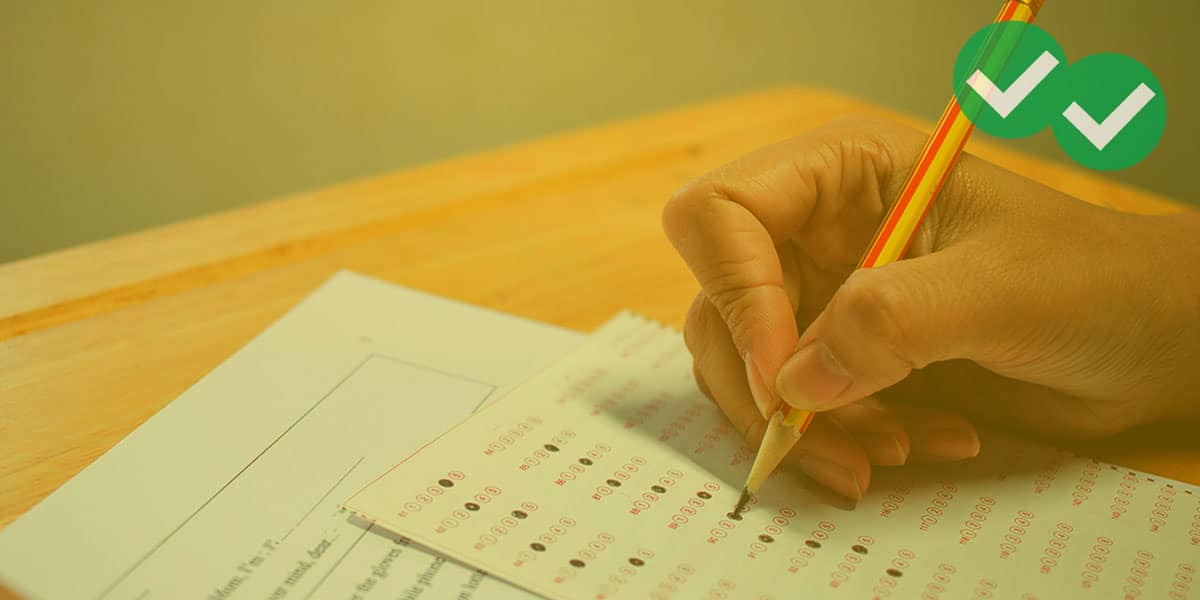Below is a challenging GRE question. However, instead of just having you take a blind hack at it, I want to provide a little bit of context.
First off, if you sense that a question is very difficult on the test – be it a verbal or quantitative one – then skip it. Because the new GRE allows you to skip, you should take advantage of this option when you encounter a question that you either have no idea how to approach, or sense that you can probably get the answer, but doing so will be time consuming.
The good news is, each question is worth the same number of points, so even if you blindly guess on a really difficult question, the worst that can happen is you guess incorrectly, and simply only lose one point. The worst that can happen is, you become so caught up in solving one problem that you miss attacking any number of easy questions that you could have answered correctly, had you not burned your precious minutes on the difficult question.
The key is learning to gauge when a hard problem is truly a difficult one, and when you are simply stressed because of the nature of the situation (you are taking the GRE, after all). The best way to prepare for this is by doing practice problems, and practice tests, so you get a sense of where it is advantageous to skip, and where it is better to see a problem through till the end (usually, if you spend a minute staring at a problem without any noticeable progress, it is time to move on).
Now that I’ve finished prefacing challenging questions, try the following one. And, in this case, don’t simply give up after a minute – this isn’t the real test, so you can spend a few minutes. The important part is how you approach the problem. Remember, taking an approach and following through on it is better than simply staring at the screen, and rereading the problem over and over again. Good luck!
A “descending number” is a three-digit number, such that the units digit is less than the tens digits and the tens digit is less than the hundreds digit. What is the probability that a three-digit number chosen at random is a “descending number”?
(A) 3/25
(B) 2/9
(C) 2/15
(D) 1/9
(E) 1/10






Comments
16 responses to “Strategies for Difficult GRE Questions”
I am still in a mess with this problem. I did not even understand how the 900 outcomes of a 3 digit integer counts?
However thanks for the brainstorming !
Hi Feroz,
Don’t worry about this ridiculously difficult problem–unless you get the most difficult section you are unlikely to see anything this tough (and even then, the counting problems will likely be easier).
The takeaway from this question for you should be the fundamental counting principle: if you n choices for category 1, x choices for category 2, and y choices for category 3, multiply them together to find out how many total possibilities.
In this case category 1 is the hundreds digit, category 2 the tens digit, and category 3 the units digit. There are 9 different numbers that can go in the hundreds place, 10 different numbers that can go in the tens place, and 10 different numbers that can go in the units place: 9 x 10 x 10 = 900.
That knowledge will help you on many other problems. As for the rest of the problem, don’t worry about it :).
Hope that helps!
Could you please provide the answer for the question mentioned in the post?
Thanks!
Agreed; a solution would be quite handy! Thanks!
Hmm…there did used to be the video explanation…oh well, here is a written explanation:
Let’s assume the units digit is ‘0’. Then, there are a total of 72 different numbers that can go in the hundreds and units combined: 9 for the hundreds and 8 for the tens. However, out of these 72 half of them are not valid because the tens will be greater than the hundreds. That leaves us with 36 possibilities.
Now let’s assume the units digit is ‘1’. That leaves us with 8 possibilities for the hundreds and 7 possibilities for the tens (8×7 = 56. Again, we have to divide by 2, since in half of the 56 the tens will not be less than the hundreds, giving us 28).
Following this logic of raising the units up by 1, I get the following:
If units ‘2’ = (7×6)/2 = 21
If units ‘3’ = (6×5)2 = 15
If units ‘4’ = (5×4)/2 = 10
If units ‘5’ = (4×3)2 = 6
If units ‘6’ = (3×2)/2 = 3
If units ‘7’ = (2×1)2 = 1
Giving us 36+28+21+15+10+6+3+1
120/900 = 2/15.
Now that I’ve done this the long way, I realize that there is a much shorter way :).
For any arrangement of three numbers, there is only one in which the numbers are arranged so that the units are less than the tens, which are less than the hundreds: 10x9x8 are the total different combinations of three different integers. Only one of the six possible arrangements (remember 3! gives us 6) matches up with the restraints in the problem. That gives us 120.
All that said, this question is much more difficult than anything that would show up on the GRE (though maybe not the GMAT).
Hope that helps!
Hi Chris,
There used to be a video explanation to this problem. It would be very helpful if you provided the link to it or explained the answer.
Thanks
I suggest that you clarify the wording in the problem itself: N is a set of 3 digit integers satisfying the condition that the digits are in descending order, and there are no repeating numbers. (technically 977 is in descending order…)
I managed to solve it, but had to guess what you meant.
Thanks,
Trent
Thanks for the feedback :). I changed the wording of the problem so that it is more clear!
Hi, Chris I wanted to ask that what is the probability that these kind of questions come in the GRE exam.
One thing that I have noticed from your posts of the challenge problems is that they have complex permutation or combination concept involved.
Does this mean that usually when GRE has a challenging problem in the exam its related to Permtation,combination ?
Hi Sab,
Good question! Honestly, I don’t think the combinations/permutation questions on the actual GRE will be anywhere nearly as difficult as those found in my challenge problems. The good news is if you are getting most of my questions right, the ones on the test should be a breeze. Another nugget of good news: If you are missing most of mine, don’t despair.
@jonah, indeed this is a much easier way of solving the question. Thanks!
Actually, there is a much much easier way to do this problem.
Just lay out the numbers like this:
9 – 8 – 7 – 6 – 5 – 4 – 3 – 2 – 1 – 0
Then, all we need to do is remove any 7 of the numbers and we will have a 3 digit number in descending order.
For example, if we take away 9,7,6,5,3,2,1 then we are left with 840. You can do the same thing no matter which 7 numbers you take away.
SO… using combinations there are 10 choose 7 ways to remove 7 numbers. That is 120. It’s the same number you got but without all of the multiplying and summing.
Then, just divide 120 by the total number of 3 digit numbers like you did.
Jonah,
Brilliant! That’s definitely a much better way of doing. I like the reasoning. It basically took my approach one step further – I only used combinations for the last two digits instead of doing it one fell swoop the way you did. Nicely done.
THANKS CHRIS
Nice problem, I have to go back to my school days to remember those probability problems.(they are particularly distasteful with dice and bags of colored balls,sigh..) I don’t know why, but somehow I preferred the brute force method , but i guess you cant do it with more no. of digits . I checked out your reviews on books for GRE and went for barrons based on your B- for it ….I feel my analytical writing and verbal skills are my areas to improve did i make a right choice ? ..Further will glancing at flashcards help as I feel I am able to remember a word more easily when it is used in context rather than it being read aloof ?
Akshay,
Since your focus is verbal and writing, I think you made the right choice with Barron’s. Again, don’t feel you have to only use Barron’s. Make sure to supplement your studying with official material.
Glancing at flashcards won’t be that helpful. You should definitely focus on learning a word in context for the new GRE.
Let me know if you have any more questions,
Chris
Thank you . your daily articles on arithmetic and verbal skill questions are the best . :).